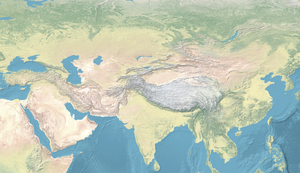Pax Gupta
Pax Gupta or Pax Guptana (Latin for "Gupta Peace", modelled after Pax Romana) is a historiographical term sometimes used to describe the social and economic peace in the regions under the Gupta Empire between 4th and 5th centuries CE, notably in the Indus Valley and Northern India.[1]
Background
[edit]This period ushered an unprecedented growth and development of scientific knowledge in the Indian subcontinent, particularly in the fields of art, mathematics and astrology and is called the golden age of India.[2] Many Hindu epics and literary sources, such as the Mahabharata and Ramayana, were canonised during this period.[3] The Gupta period produced the scholars Kalidasa,[4] Aryabhata, Varahamihira, and Vatsyayana who made great advancements in many academic fields.[5][6] The game of chess developed during this period.[7]
See also
[edit]- Pax Kushana, a period of relative peace in the preceding Kushan Empire
References
[edit]Citations
[edit]- ^ Sinha, Bindeshwari Prasad (1977). Dynastic History of Magadha, Cir. 450-1200 A.D. Abhinav Publications. p. 2.
- ^ Goyal, Shankar (2001). Problems of Ancient Indian History: New Perspectives and Perceptions. Book Enclave. ISBN 978-81-87036-66-1.
- ^ Gupta dynasty (Indian dynasty) Archived 30 March 2010 at the Wayback Machine. Britannica Online Encyclopedia. Retrieved 21 November 2011.
- ^ Keay, John (2000). India: A history. Atlantic Monthly Press. pp. 151–52. ISBN 978-0-87113-800-2.
Kalidasa wrote ... with an excellence which, by unanimous consent, justifies the inevitable comparisons with Shakespeare ... When and where Kalidasa lived remains a mystery. He acknowledges no links with the Guptas; he may not even have coincided with them ... but the poet's vivid awareness of the terrain of the entire subcontinent argues strongly for a Guptan provenance.
- ^ Vidya Dhar Mahajan 1990, p. 540.
- ^ Keay, John (2000). India: A history. Atlantic Monthly Press. p. 132. ISBN 978-0-87113-800-2.
The great era of all that is deemed classical in Indian literature, art and science was now dawning. It was this crescendo of creativity and scholarship, as much as ... political achievements of the Guptas, which would make their age so golden.
- ^ Murray, H.J.R. (1913). A History of Chess. Benjamin Press (originally published by Oxford University Press). ISBN 978-0-936317-01-4. OCLC 13472872.
Sources
[edit]- Vidya Dhar Mahajan (1990). A History of India. State Mutual Book & Periodical Service. ISBN 978-0-7855-1191-5. Archived from the original on 10 January 2020. Retrieved 29 August 2018.

